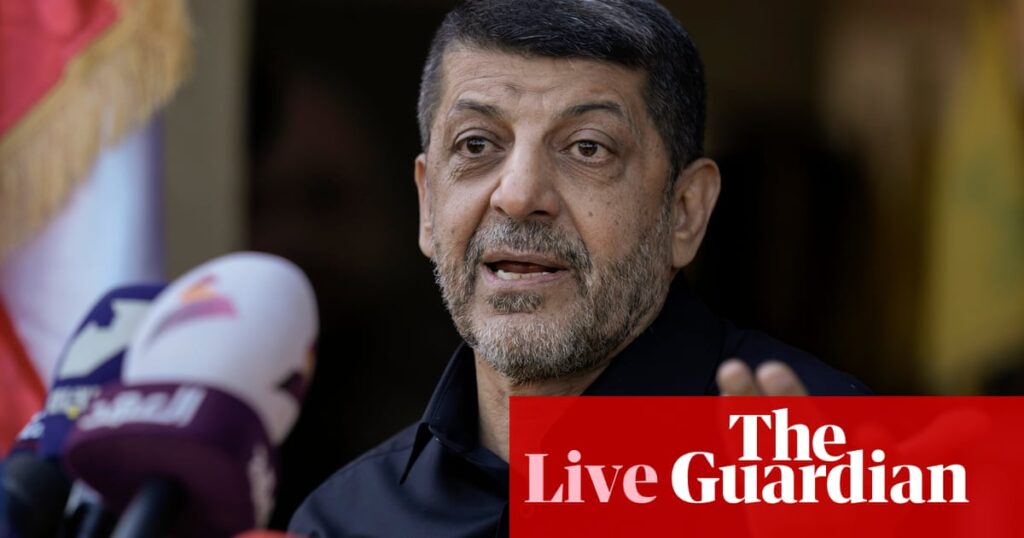Key events
Here are some images from the scene in Beirut, where an Israeli strike is believed to have killed Hezbollah spokesperson Mohammed Afif:
Sunday’s strike by Israel killed one person – reported to be Hezbollah spokesperson Mohammed Afif – and injured three, according to the Lebanon health ministry.
AFP cited the official National News Agency as reporting that the strike by “enemy aircraft” caused “great destruction”, with an unspecified number of people “trapped under the rubble” in Ras al-Nabaa.
The NNA said “one of the residents of a neighbouring building had received a warning call urging evacuation but it was not taken seriously”.
Ali Hijazi, secretary-general of the Lebanese branch of the Ba’ath party, has “confirmed the death of Hezbollah media official” Mohammed Afif, reports AFP, citing the official National News Agency.
Israel has yet to comment on the reported death of Afif.
Afif had been the public face of Hezbollah in several press conferences after Israel’s assassination of leader Hassan Nasrallah in September this year.
He is pictured here at a press conference in Beirut earlier this week:
Israeli strike in northern Gaza reportedly kills dozens of Palestinians

Jason Burke
Dozens of Palestinians have been killed or injured by an Israeli strike on a multistorey residential building in Beit Lahiya, northern Gaza, local medics and officials in the territory have said.
The government media office in Gaza, which is run by Hamas, put the number of those killed at 72. It said the strike on Sunday morning hit a residential building that housed six families.
There was no independent confirmation of the reports or the reported death toll, which followed intensive Israeli bombardment of targets across Gaza in recent days. Israeli officials have previously accused authorities in Gaza of systematically exaggerating reports of casualties from strikes in the territory.
William Christou reports for the Guardian from Beirut on the strike by Israeli forces on a Ba’ath party center in Ras al-Nabaa, central Beirut, on Sunday afternoon, the first strike on central Beirut in over a month:
The attack on the busy residential neighbourhood came without warning, and appeared to cause damage to neighbouring buildings.
The strike comes as Israel intensifies its airstrikes across Lebanon as Lebanese officials prepare to give their response to an Israeli ceasefire proposal on Monday. The Israeli military issued a series of evacuation warnings on Saturday and Sunday for Dahiyeh, the southern suburbs of Beirut, striking over a dozen targets in bombings heard across the capital city.
Israeli soldiers continue to advance on the ground in south Lebanon, with Israeli soldiers reaching the village of Chamaa – about three miles from the Lebanese-Israel border. Hezbollah stepped up its attacks in northern Israel in tandem, announcing the targeting of five military targets in Haifa on Saturday night.
Lebanese officials noted positive steps in the ceasefire negotiations, though they said that an Israeli request for a western-led mediation body in Lebanon was a stumbling block. Israeli demands reportedly involve pushing Hezbollah past the Litani river, some 18 miles from the border.
The Israeli military intensification is reportedly meant to put pressure on Lebanese negotiators, who accused their Israeli counterparts of conducting negotiations “under fire”.
Hezbollah spokesperson killed in Israeli strike
The first Israeli airstrike on central Beirut in over a month has killed Mohammed Afif, the main spokesperson for Hezbollah, an official from the group has confirmed to the Guardian and Associated Press.
AP reports:
Afif had been especially visible after Israel’s military escalation in September and following the assassination of longtime Hezbollah leader Hassan Nasrallah, who was also killed in an Israeli airstrike.
Israeli warplanes had earlier pounded the southern suburbs of Beirut after the military warned people to evacuate from several buildings. The Hezbollah militant group has a strong presence in the area, known as the Dahiyeh, and the strikes came as Lebanese officials are considering a U.S.-brokered cease-fire proposal.
